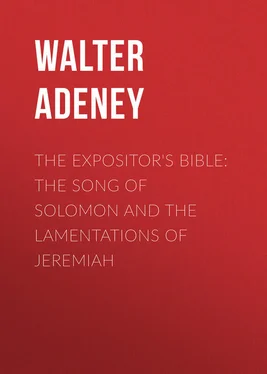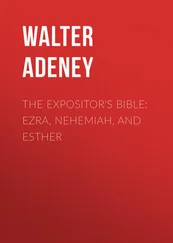Walter Adeney - The Expositor's Bible - The Song of Solomon and the Lamentations of Jeremiah
Здесь есть возможность читать онлайн «Walter Adeney - The Expositor's Bible - The Song of Solomon and the Lamentations of Jeremiah» — ознакомительный отрывок электронной книги совершенно бесплатно, а после прочтения отрывка купить полную версию. В некоторых случаях можно слушать аудио, скачать через торрент в формате fb2 и присутствует краткое содержание. Издательство: Иностранный паблик, Жанр: foreign_religion, foreign_antique, foreign_prose, на английском языке. Описание произведения, (предисловие) а так же отзывы посетителей доступны на портале библиотеки ЛибКат.
- Название:The Expositor's Bible: The Song of Solomon and the Lamentations of Jeremiah
- Автор:
- Издательство:Иностранный паблик
- Жанр:
- Год:неизвестен
- ISBN:нет данных
- Рейтинг книги:3 / 5. Голосов: 1
-
Избранное:Добавить в избранное
- Отзывы:
-
Ваша оценка:
- 60
- 1
- 2
- 3
- 4
- 5
The Expositor's Bible: The Song of Solomon and the Lamentations of Jeremiah: краткое содержание, описание и аннотация
Предлагаем к чтению аннотацию, описание, краткое содержание или предисловие (зависит от того, что написал сам автор книги «The Expositor's Bible: The Song of Solomon and the Lamentations of Jeremiah»). Если вы не нашли необходимую информацию о книге — напишите в комментариях, мы постараемся отыскать её.
The Expositor's Bible: The Song of Solomon and the Lamentations of Jeremiah — читать онлайн ознакомительный отрывок
Ниже представлен текст книги, разбитый по страницам. Система сохранения места последней прочитанной страницы, позволяет с удобством читать онлайн бесплатно книгу «The Expositor's Bible: The Song of Solomon and the Lamentations of Jeremiah», без необходимости каждый раз заново искать на чём Вы остановились. Поставьте закладку, и сможете в любой момент перейти на страницу, на которой закончили чтение.
Интервал:
Закладка:
The Shulammite now seems to be attempting a retreat, and the ladies of the court bid her return; they would see the performance of a favourite dance, known as "The Dance of Mahanaim." 59 59 vi. 13. This is obscured in the Authorised Version.
Thereupon we have a description of the performer, as she was seen during the convolutions of the dance, dressed in a transparent garment of red gauze, – perhaps such as is represented in Pompeian frescoes, – so that her person could be compared to pale wheat surrounded by crimson anemones. 60 60 vii. 1-9.
It is quite against the tenor of her conduct to suppose that the modest country girl would degrade herself by ministering to the amusement of a corrupt court in this shameless manner. It is more reasonable to conclude that the entertainment was given by a professional dancer from among the women of the harem. We have a hint that this is the case in the title applied to the performer, in addressing whom Solomon exclaims, "O prince's daughter," 61 61 vii 1.
] an expression never used for the poor Shulammite, and one from which we should gather that she was a captive princess who had been trained as a court dancer. The glimpse of the manners of the palace helps to strengthen the contrast of the innocent, simple country life in which the Shulammite delights.
It has been suggested, with some degree of probability, that the Shulammite is supposed to make her escape while the attention of the king and his court is diverted by this entrancing spectacle. It is to be observed, at all events, that from this point onwards to the end of the poem, neither Solomon nor the daughters of Jerusalem take any part in the dialogue, while the scene appears to be shifted to the Shulammite's home in the country, where she and the shepherd are now seen together in happy companionship. The bridegroom has come to fetch his bride. Again she owns that she is his, and delights in the glad thought that his heart goes out to her. 62 62 vii. 10.
She bids him come with her into the field, and lodge in the villages. They will get them early into the vineyards and see whether the vines are blooming, and whether the pomegranates are in blossom. 63 63 vii. 11-13.
It is still early spring. It was early spring when she was snatched away. Unless she had been a whole year at the palace, – an impossible situation with the king continuing his ineffectual courtship for so long a time, – we have no movement of time. But the series of events from the day when the Shulammite was seized in her nut garden, till she found herself back again in her home in the north country, after the trying episode of her temporary residence in the royal palace, must have occupied some weeks. And yet the conclusion of the story is set in precisely the same stage of spring, the time when people look for the first buds and blossoms, as the opening scenes. It has been proposed to confine the whole action to the northern district, where Solomon might have had a country house adjoining his vineyard. 64 64 viii. 11.
The presence of the "daughters of Jerusalem," and allusions to the streets of the city, its watchmen, and the guard upon the walls, are against this notion. It is better to conclude that we have here another instance of the idealism of the poem. Since early spring is the season that harmonises most perfectly with the spirit of the whole work, the author does not trouble himself with adapting its scenes in a realistic manner to the rapidly changing aspects of nature.
The shepherd has addressed the Shulammite as his sister; 65 65 viii. 1.
she now reciprocates the title by expressing her longing that he had been as her brother. 66 66 viii. 1.
This singular mode of courtship between two lovers who are so passionately devoted to one another that we might call them the Hebrew Romeo and Juliet, is not without significance. Its recurrence, now on the lips of the bride, helps to sharpen still more the contrast between what passes for love in the royal harem, and the true emotion experienced by a pair of innocent young people, unsullied by the corruptions of the court – illustrating, as it does at once, its sweet intimacy and its perfect purity.
The proud bride would now lead her swain to her mother's house. 67 67 viii. 2.
There is no mention of her father; apparently he is not living. But the fond way in which this simple girl speaks of her mother reveals another lovely trait in her character. She has witnessed the wearisome magnificence of Solomon's palace. It was impossible to associate the idea of home with such a place. We never hear the daughters of Jerusalem, those poor degraded women of the harem, speaking of their mothers. But to the Shulammite no spot on earth is so dear as her mother's cottage. There her lover shall have spiced wine and pomegranate juice – simple home-made country beverages. 68 68 viii. 2.
Repeating one of the early refrains of the poem, the happy bride is not afraid to say that there too her husband shall support her in his strong embrace. 69 69 viii. 3.
She then repeats another refrain, and for the last time – surely one would say now, quite superfluously – she adjures the daughters of Jerusalem not to awaken any love for Solomon in her, but to leave love to its spontaneous course. 70 70 viii. 4.
Now the bridegroom is seen coming up from the wilderness with his bride leaning upon him, and telling how he first made love to her when he found her asleep under an apple tree in the garden of the cottage where she was born. 71 71 viii. 5.
As they converse together we reach the richest gem of the poem, the Shulammite's impassioned eulogy of love. 72 72 viii. 6, 7.
She bids her husband set her as a seal upon his heart in the inner sanctuary of his being, and as a seal upon his arm – always owning her, always true to her in the outer world. She is to be his closely, his openly, his for ever. She has proved her constancy to him; now she claims his constancy to her. The foundation of this claim rests on the very nature of love. The one essential characteristic here dwelt upon is strength – "Love is strong as death." Who can resist grim death? who escape its iron clutches? Who can resist mighty love, or evade its power? The illustration is startling in the apparent incompatibility of the two things drawn together for comparison. But it is a stern and terrible aspect of love to which our attention is now directed. This is apparent as the Shulammite proceeds to speak of jealousy which is "hard as the grave." If love is treated falsely, it can flash out in a flame of wrath ten times more furious than the raging of hatred – "a most vehement flame of the Lord." This is the only place in which the name of God appears throughout the whole poem. It may be said that even here it only comes in according to a familiar Hebrew idiom, as metaphor for what is very great. But the Shulammite has good reason for claiming God to be on her side in the protection of her love from cruel wrong and outrage. Love as she knows it is both unquenchable and unpurchasable. She has tested and proved these two attributes in her own experience. At the court of Solomon every effort was made to destroy her love for the shepherd, and all possible means were employed for buying her love for the king. Both utterly failed. All the floods of scorn which the harem ladies poured over her love for the country lad could not quench it; all the wealth of a kingdom could not buy it for Solomon. Where true love exists, no opposition can destroy it; where it is not, no money can purchase it. As for the second idea – the purchasing of love – the Shulammite flings it away with the utmost contempt. Yet this was the too common means employed by a king such as Solomon for replenishing the stock of his harem. Then the monarch was only pursuing a shadow; he was but playing at love-making; he was absolutely ignorant of the reality.
Интервал:
Закладка:
Похожие книги на «The Expositor's Bible: The Song of Solomon and the Lamentations of Jeremiah»
Представляем Вашему вниманию похожие книги на «The Expositor's Bible: The Song of Solomon and the Lamentations of Jeremiah» списком для выбора. Мы отобрали схожую по названию и смыслу литературу в надежде предоставить читателям больше вариантов отыскать новые, интересные, ещё непрочитанные произведения.
Обсуждение, отзывы о книге «The Expositor's Bible: The Song of Solomon and the Lamentations of Jeremiah» и просто собственные мнения читателей. Оставьте ваши комментарии, напишите, что Вы думаете о произведении, его смысле или главных героях. Укажите что конкретно понравилось, а что нет, и почему Вы так считаете.












